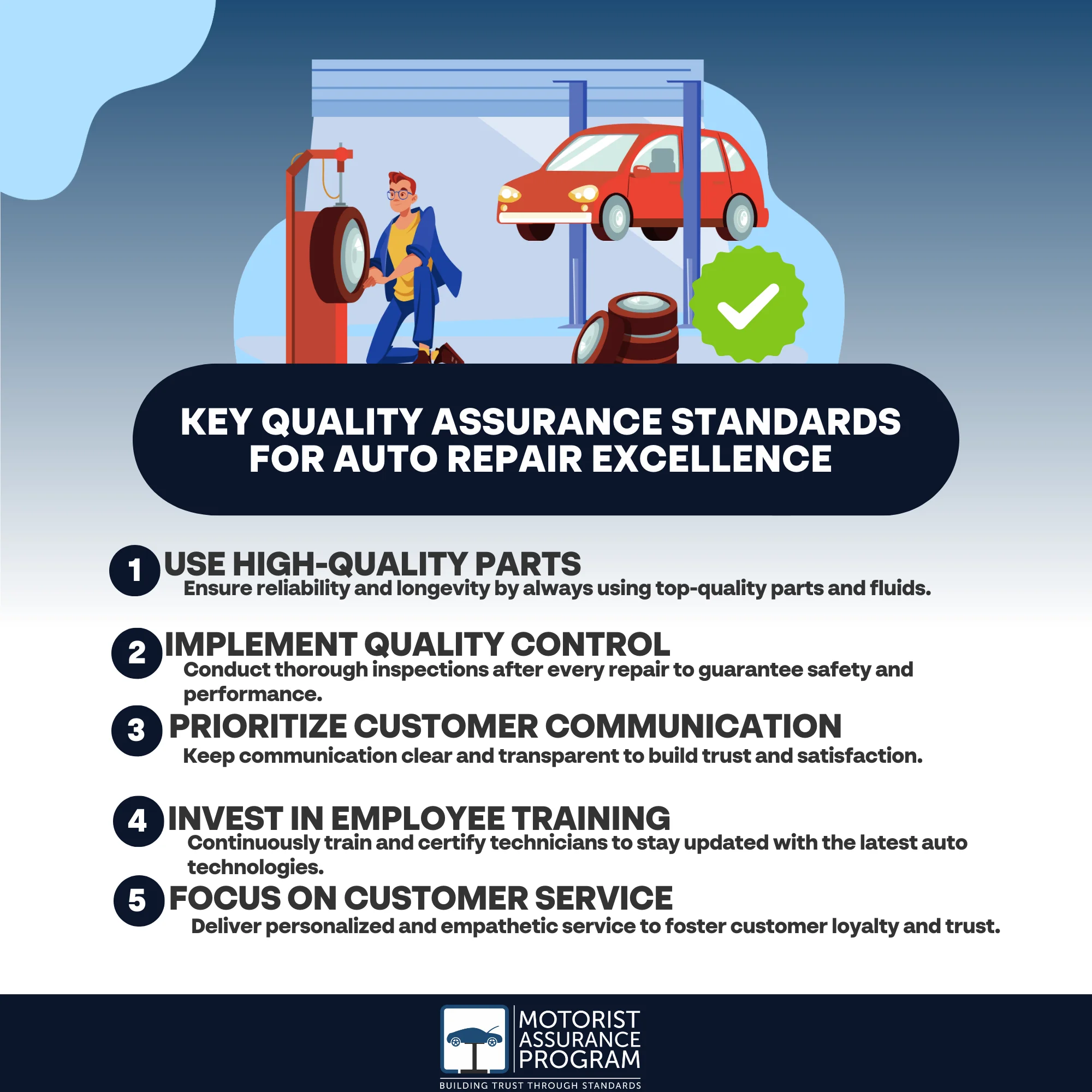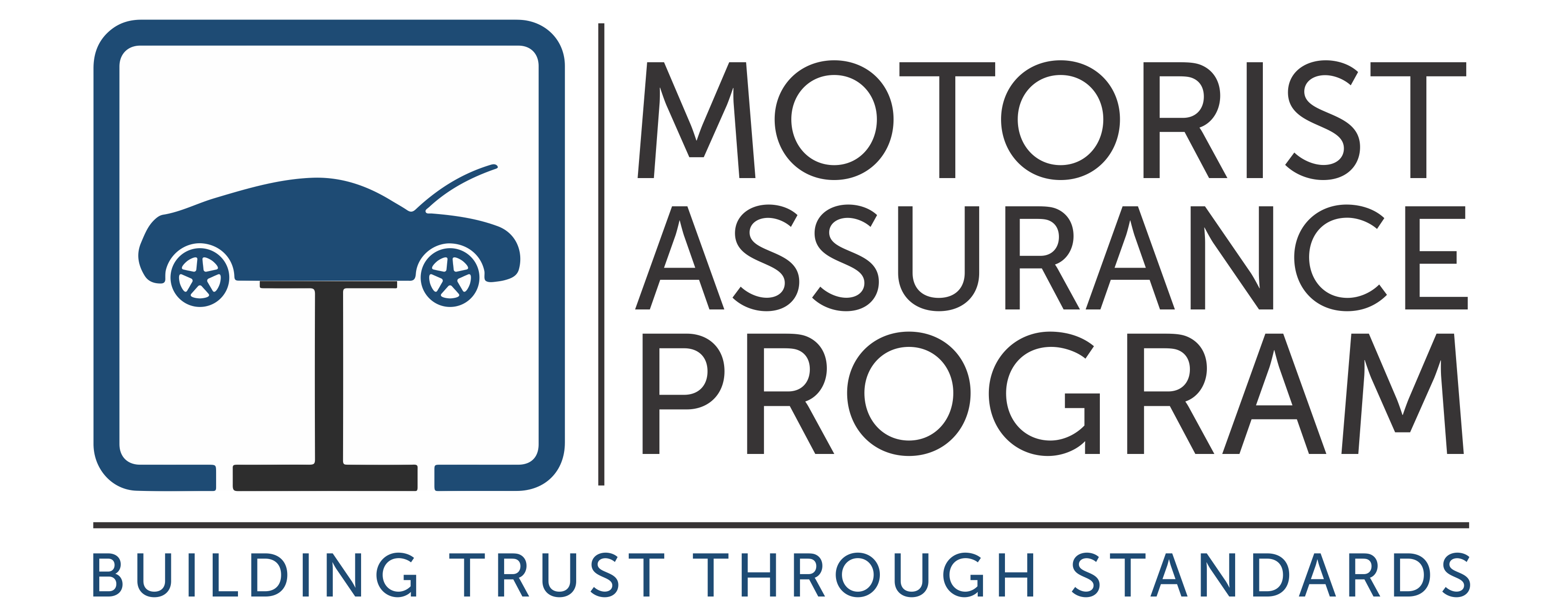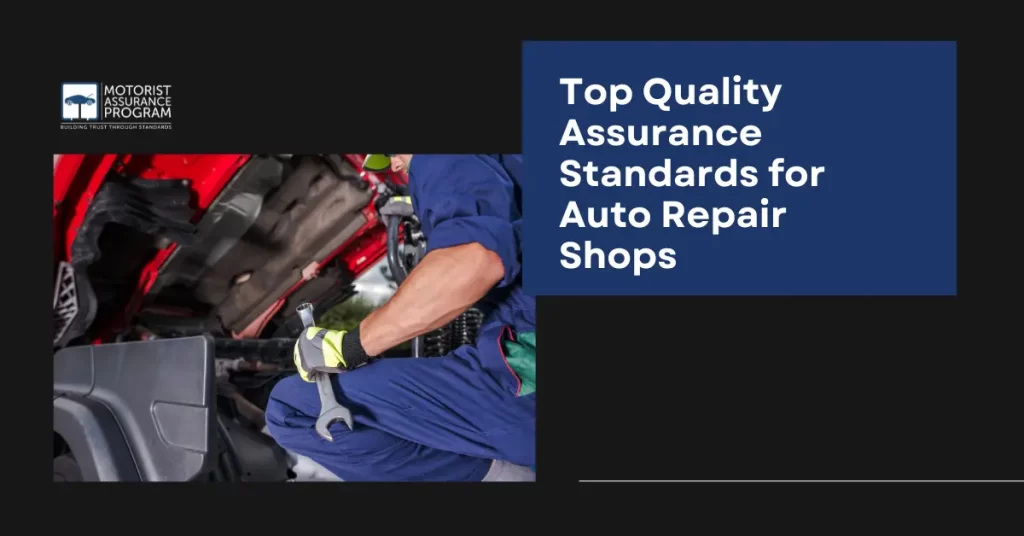To establish quality standards for your auto repair shop, prioritize using high-quality parts and fluids and implement rigorous quality control measures. Guarantee clear communication with customers about services, while also valuing their feedback for continuous improvement. Proper employee training and ongoing education are crucial, keeping your technicians adept with modern techniques. Don’t neglect customer service—genuine empathy and personalization can greatly build trust. Finally, promote regular inspections and proactive maintenance to enhance vehicle safety and efficiency. By following these standards, you create customer loyalty and peace of mind; more insights and tips await you just ahead.

Key Takeaways
-
Use high-quality parts and fluids to ensure vehicle longevity and reliability.
-
Implement stringent quality control processes with thorough inspections for safety.
-
Maintain transparent communication about services and recommendations to build trust.
-
Provide timely service delivery without compromising on workmanship quality.
-
Actively seek and respond to customer feedback to continuously improve services.
Importance of Quality Assurance
When it comes to auto repair, quality assurance is vital for guaranteeing customer satisfaction and safety on the road. You want to drive with confidence, knowing your vehicle’s been properly serviced. That’s where quality control comes into play.
By establishing stringent quality control measures, you can guarantee that every repair meets high standards. This not only helps in fixing the immediate issue but also prevents future problems that could arise from overlooked details.
Service reliability is another critical factor. When your auto shop consistently delivers reliable services, you build a strong relationship with your customers.
They’ll trust you to get the job done right the first time, which is invaluable in today’s competitive market. It’s not just about fixing cars; it’s about providing peace of mind.
Key Quality Standards
Quality assurance in auto repair relies on clearly defined standards that every shop should uphold. These key quality standards guarantee that you receive reliable and safe service for your vehicle.
First, service standards should encompass a commitment to using high-quality parts and fluids. This not only enhances the longevity of your vehicle but also guarantees peak performance.
Next, quality control processes must be in place. This means that every repair should undergo a thorough inspection before it leaves the shop. You deserve to know that your car has been meticulously checked for safety and reliability.
Also, shops should maintain transparent communication regarding the services performed and any additional recommendations.
Another crucial aspect is timeliness. Quality standards should include prompt service delivery without compromising on workmanship. It’s important for you to feel confident that your vehicle will be ready when promised.
Lastly, customer feedback plays a critical role. Shops should actively seek and respond to your reviews, using this information to improve their services.
Employee Training and Certification
Employee training and certification are vital components of a successful auto repair shop. You want your team to be well-versed in the latest techniques and technologies, especially as advancements such as driver assistance technologies become more prevalent in modern vehicles.
Hands-on experience is vital; it helps technicians apply their knowledge in real-world situations, solving problems efficiently. When employees participate in training programs, they gain the skills needed to diagnose issues accurately and perform repairs correctly.
Ongoing education is equally important. The automotive industry is constantly evolving, with new models and technologies emerging all the time. By encouraging your staff to pursue further training and certification, you guarantee they stay current with industry trends and standards.
This commitment to learning boosts their confidence and enhances the overall quality of service your shop provides.
Investing in employee training also shows that you value their development and well-being. It creates a culture of excellence and motivates them to perform at their best.
Customer Service Excellence
A skilled team is only part of what makes an auto repair shop thrive; outstanding customer service is equally important. When you walk into a shop, you want to feel welcomed and understood. This begins with attentive listening and genuine empathy from the staff.
Prioritizing customer feedback helps you identify areas for improvement and builds trust. When clients feel heard, they’re more likely to return and recommend your services.
Service personalization can set your shop apart. By recognizing returning customers and their unique needs, you can create a tailored experience that fosters loyalty. For instance, remembering a client’s previous issues or preferences demonstrates that you value them as more than just another appointment.
Training your staff to engage positively with customers is essential. Encouraging them to ask questions and provide clear explanations about the repairs helps demystify the process, making clients feel more confident in their decisions.
Ultimately, excellent customer service isn’t just a nice addition; it’s a fundamental aspect of running a successful auto repair shop. By focusing on customer feedback and service personalization, you can create an environment where everyone feels valued and empowered.
Regular Inspection and Maintenance
Regular inspections and maintenance are vital to keeping vehicles in top condition and ensuring safety on the road. For electric and hybrid vehicles, understanding their unique maintenance needs is particularly important.
By implementing preventive measures, you’re not only extending the life of your vehicle but also ensuring that it runs efficiently. Familiarity with the specific requirements for electric and hybrid vehicle maintenance can also help in preventing unexpected issues.
You should aim for an inspection frequency that suits your driving habits and vehicle type. For instance, many experts recommend a thorough inspection every six months, while others suggest annual checks for less frequently used vehicles.
Keeping an eye on essential components like brakes, tires, and fluid levels can prevent unexpected breakdowns and safety hazards.
Don’t wait for warning lights to appear on your dashboard; proactive maintenance is key. It’s about taking charge of your vehicle’s health, and when you prioritize regular inspections, you’re investing in your safety and peace of mind.
So, make it a habit to schedule those visits to your auto repair shop. Remember, a well-maintained vehicle doesn’t just perform better; it also enhances your overall driving experience.
Frequently Asked Questions
What Certifications Should Auto Repair Shops Prioritize for Their Technicians?
When choosing certifications for technicians, prioritize ASE Certification for technical skills, Manufacturer Certifications for specific vehicles, Customer Service Training for client interactions, and Environmental Standards to guarantee compliance with regulations and promote sustainability in your shop.
How Can Customers Evaluate an Auto Repair Shop’s Quality Standards?
When choosing an auto repair shop, trust your instincts. Look for customer feedback and service transparency; they reveal the shop’s true character, ensuring you make a wise choice.
What Are Common Signs of Quality Assurance Issues in Repair Shops?
You might notice quality assurance issues if you see inconsistent repairs or hear frequent customer complaints. These signs indicate potential problems with the shop’s processes, which could impact your experience and vehicle’s performance.
How Often Should Auto Repair Shops Update Their Quality Standards?
You should update your quality standards regularly, ideally every year. This frequency aligns with best practice updates in the industry, ensuring you stay competitive and meet evolving customer expectations while maintaining service excellence.
What Role Does Technology Play in Maintaining Quality Standards in Auto Repair?
Technology plays an essential role in maintaining quality standards. By utilizing advanced diagnostic tools, you can quickly identify issues, while customer feedback helps you refine services, ensuring consistent quality and satisfaction in every repair.
Conclusion
In summary, prioritizing quality standards in auto repair shops isn’t just about fixing cars; it’s about ensuring safety and reliability for you and your loved ones. By investing in employee training, customer service, and regular inspections, you’re setting the stage for a trustworthy experience. Embrace these practices, and you’ll drive away with peace of mind, knowing your car is in excellent condition.


